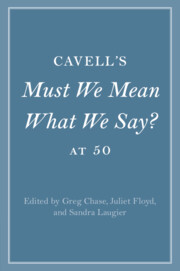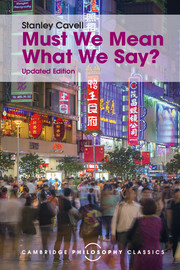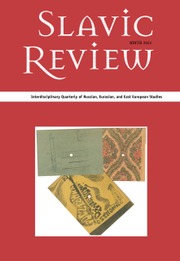Cavell's Must We Mean What We Say? at 50
$105.00 ( ) USD
Part of Cambridge Philosophical Anniversaries
- Editors:
- Greg Chase, College of the Holy Cross, Massachusetts
- Juliet Floyd, Boston University
- Sandra Laugier, Université de Paris I Panthéon Sorbonne
- Date Published: March 2022
- availability: This ISBN is for an eBook version which is distributed on our behalf by a third party.
- format: Adobe eBook Reader
- isbn: 9781009103237
Find out more about Cambridge eBooks
$
105.00 USD
( )
Adobe eBook Reader
Other available formats:
Hardback, Paperback
Looking for an examination copy?
If you are interested in the title for your course we can consider offering an examination copy. To register your interest please contact [email protected] providing details of the course you are teaching.
-
In 1969 Stanley Cavell's Must We Mean What We Say? revolutionized philosophy of ordinary language, aesthetics, ethics, tragedy, literature, music, art criticism, and modernism. This volume of new essays offers a multi-faceted exploration of Cavell's first and most important book, fifty years after its publication. The key subjects which animate Cavell's book are explored in detail: ordinary language, aesthetics, modernism, skepticism, forms of life, philosophy and literature, tragedy and the self, the questions of voice and audience, jazz and sound, Wittgenstein, Austin, Beckett, Kierkegaard, Shakespeare. The essays make Cavell's complex style and sometimes difficult thought accessible to a new generation of students and scholars. They offer a way into Cavell's unique philosophical voice, conveying its seminal importance as an intellectual intervention in American thought and culture, and showing how its philosophical radicality remains of lasting significance for contemporary philosophy, American philosophy, literary studies, and cultural studies.
Read more- Makes Cavell's difficult style and thought accessible and clear for a wide range of readers
- Places his work in its philosophical and historical context and shows its present relevance
- Includes contributions from the major scholars of Cavell studies from a range of disciplines
Customer reviews
Not yet reviewed
Be the first to review
Review was not posted due to profanity
×Product details
- Date Published: March 2022
- format: Adobe eBook Reader
- isbn: 9781009103237
- availability: This ISBN is for an eBook version which is distributed on our behalf by a third party.
Table of Contents
Introduction: Part I. Ordinary Language and its Philosophy:
1. Must we mean what we say? and ordinary language philosophy Sandra Laugier
2. Revolutionary uses of Wittgenstein in must we mean what we say? Juliet Floyd
3. Actions and their elaboration Jean-Philippe Narboux
4., Faces of the ordinary Eli Friedlander
Part II. Aesthetics and the Modern:
5. Language-games and 'forms of life': Cavell's reading of Wittgenstein and its relevance to literary studies Greg Chase
6. Philosophic and aesthetic appeal: Stanley Cavell on the irreducibility of the first person in aesthetics and in philosophy Arata Hamawaki
7. Reading into it or hearing it out? Cavell on modernism and the art critic's hermeneutical risk Robert Engelman
8. Must we sing what we mean?: 'Music discomposed' and philosophy composed Vincent Colapietro
Part III. Tragedy and the Self:
9. Philosophy as autobiography: From must we mean what we say? to little did I know Naoko Saito
10. The finer weapon: Cavell, philosophy and praise Victor J. Krebs
11. On Cavell's on Kierkegaard's on authority and revelation-with constant reference to Austen Kelly Jolley
12.Tragic Implication Sarah Beckwith
13. Gored states and theatrical guises Paul Standis.
Sorry, this resource is locked
Please register or sign in to request access. If you are having problems accessing these resources please email [email protected]
Register Sign in» Proceed
You are now leaving the Cambridge University Press website. Your eBook purchase and download will be completed by our partner www.ebooks.com. Please see the permission section of the www.ebooks.com catalogue page for details of the print & copy limits on our eBooks.
Continue ×Are you sure you want to delete your account?
This cannot be undone.
Thank you for your feedback which will help us improve our service.
If you requested a response, we will make sure to get back to you shortly.
×



